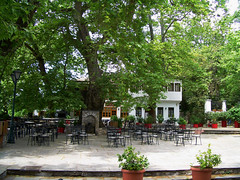Portaria Travel Guide

Portaria (Greek Πορταριά) is a traditional village situated in the Pelion mountain range, in the prefecture of Magnesia in Thessaly. It is one the biggest villages of the region (population: 1,327 inhabitants as of 2001) and it is built at an elevation of 650 metres, on the west hillside of Pelion, 13 km north of the city of Volos.
The region of Pelion is of outstanding beauty, and it is no wonder why in Greek Mythology it was thought to be the summer home of the Olympian Gods. Portaria together with its neighbouring village, Makrinitsa, are characterised as traditional villages of exceptional natural beauty. The houses in Portaria are traditionally built with flagstone roofs and they resemble those found in villages in the region of Macedonia in Northern Greece.
The village of Portaria flourished in the past, while, nowadays, it is a very popular holiday destination for any time of the year, as it is situated on the mountain, only 14 km from the nearest ski centre, and at the same time less than one hour away from gorgeous beaches, such as Kala Nera in the Pagasitikos Gulf and Mylopotamos (Tsagkarada) in the Aegean Sea.
Places to visit
- The picturesque villages of Pelion, such as Makrinitsa, Katichori, Alli Meria, Stagiates, Tsagkarada, Kala Nera and many others
- the paved square Pigi Manas, where visitors can rest among trees and running waters
- the Adamenas Square, a great place for recreation and the starting point of the Centaurs' Path leading to Pigi Manas
- the Square of Taxiarches with magnificent views to Volos and the Pagasitikos Gulf
- the Karavos Waterfall with beautiful views to Portaria
Monuments and Museums to visit
- the Athanassakio, which is one of the first kindergartens to operate in Greece
- the Museum housed in Zoulia Mansion, which operated as a Vocational School for girls in the past
- the Tsopotio School, which nowadays operates as an elementary school
- the ruins of Theoxenia, the most luxurious hotel of the pre-war era in the Balkans, established in 1905
- the Women's Agro-touristic Cooperative of Portaria, where you can taste and buy traditional products of the region made by local women, using excellent ingredients and traditional recipes
- the chapel of Panaghia Portarea (eleventh century AC)
Events to attend
- the Flower Festival taking place in May
- the World Day of Dance taking place in May
- the Folklore Festival of Aghia Triada in June
- the National Computer Congress in June
- the Tsipouro Festival happening around the beginning June
- the Children's Folklore Dance Festival in the beginning of July
- the International Festival of Traditional Dance around the end of July
- the Sausage Festival in July
- the Pelioritic Wedding, which takes place in the end of August
- the various events in the summer evenings, such as concerts, theatrical plays, exhibitions, shadow-theatre and many more
Food and Drinks to taste
- locally made preserves, jams and marmalades, made from apples, chestnuts, figs, oranges, blackberries, carrots, strawberries, mandarins, quince, grapes, aubergines and other fruits
- the local delicacy tsitsiravla, a type of pickled shoots from wild pistachio trees
- trachanas, a type of dried food based on a fermented mixture of wheat grain or flour and yoghurt, usually made into a thick soup
- fresh pasta
- herbs and spices, hand-picked from the region of Pelion
Map of Portaria with accommodations
The blue markers shows the location of various accommodations in Portaria. The letter in the marker describes the accommodation types: H for Hotel, A for Apartment, R for Resort, B for Bed & Breakfast and O for Other (e.g. pension, villa). Click on the blue marker for more information on the accommodation.










